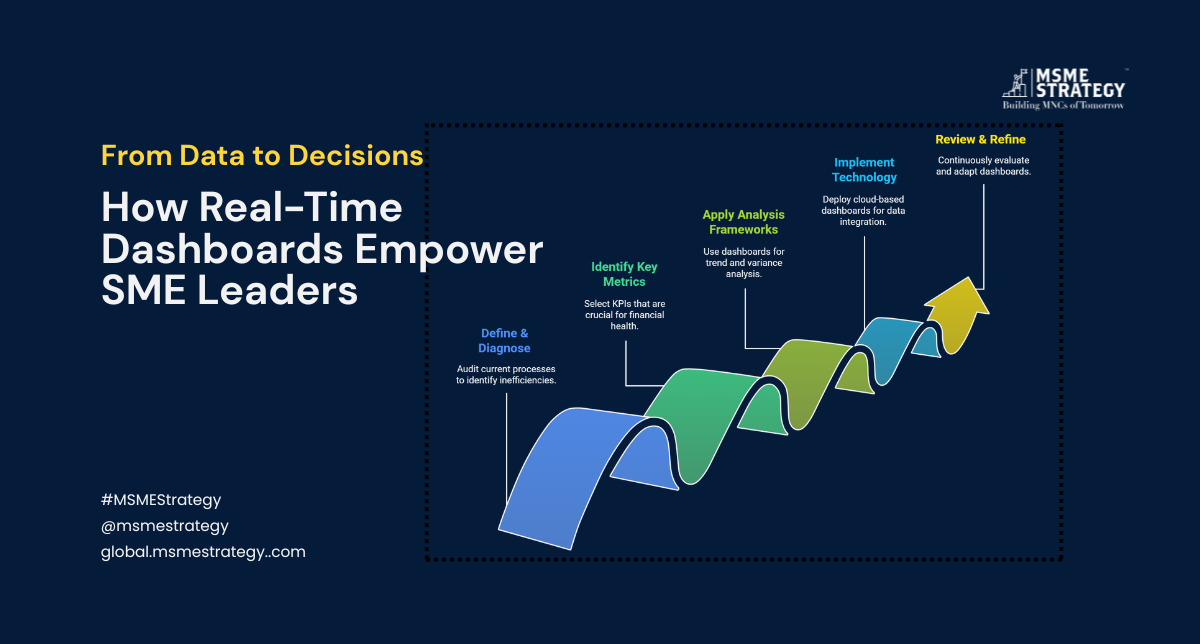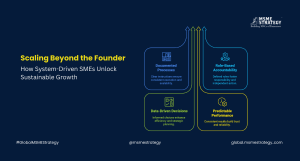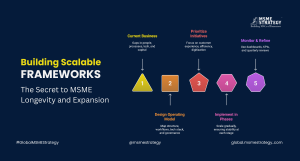Scaling up is one of the most exciting yet challenging phases for any business owner. For MSMEs in India, the leap from a stable small business to a growing enterprise often comes with questions like: How do we expand without losing control? Which areas should we prioritize? How can we manage risks while capturing opportunities?
The truth is—growth doesn’t happen by chance. It requires a clear roadmap, tested frameworks, and disciplined execution. Without structure, scaling can quickly lead to financial strain, operational chaos, or even business stagnation. That’s why applying proven frameworks becomes essential for Indian MSMEs aiming to grow systematically.
At MSME Strategy, we’ve worked closely with entrepreneurs to guide expansion journeys using structured approaches that balance ambition with practicality. Let’s explore the frameworks and strategies that can help you scale up the smart way.
Why Scaling Requires Framework
Unlike day-to-day operations, scaling demands a shift in mindset and systems. Growth often requires:
- Building capacity without overspending.
- Expanding into new markets while protecting existing ones.
- Professionalizing management without losing agility.
- Managing compliance as regulations grow more complex.
A framework-driven approach ensures that MSMEs avoid ad-hoc decisions and instead grow with confidence.
Framework 1: The Growth Roadmap Framework
This framework helps business owners chart a step-by-step path to expansion.
Key Elements:
- Vision Alignment – Define a 3- to 5-year vision with measurable milestones.
- Market Analysis – Study customer trends, competitors, and emerging demand in India.
- Capability Assessment – Evaluate internal strengths, including workforce skills, production capacity, and financial health.
- Strategic Priorities – Focus on 2–3 critical areas such as product diversification, technology adoption, or regional expansion.
- Action Plans – Translate priorities into quarterly goals with accountability.
Example in India:
A textile MSME in Tiruppur aiming to export to Europe mapped its growth roadmap by first strengthening compliance with international quality standards before expanding its production line.
Framework 2: The Operational Efficiency Framework
Scaling up is not just about selling more; it’s about running smarter. Many Indian MSMEs face rising costs, supply chain inefficiencies, and limited skilled manpower. This framework ensures operational discipline.
Core Steps:
- Process Standardization – Document workflows so that growth doesn’t depend only on the owner.
- Technology Integration – Use affordable ERP, inventory, or CRM solutions tailored for MSMEs in India.
- Lean Practices – Cut waste in procurement, production, and logistics.
- Performance Metrics – Track KPIs like cost per unit, order fulfillment time, and customer satisfaction.
Tip: Before investing in expansion, ensure your current operations can scale smoothly.
Framework 3: The Market Expansion Framework
Indian MSMEs often hesitate to step outside their comfort zone. However, new markets—whether geographical or digital—can unlock exponential growth.
Steps for Market Expansion:
- Market Selection – Use data to identify growing demand areas (e.g., Tier 2 & 3 cities).
- Channel Strategy – Explore e-commerce, government e-marketplaces (GeM), or distributor partnerships.
- Customer Segmentation – Tailor offerings for specific buyer groups (e.g., bulk buyers vs. retail).
- Regulatory Readiness – Stay compliant with GST, export-import norms, and local licenses.
- Pilot & Scale – Test in a limited geography before expanding nationwide.
Example in India:
An Ayurvedic products SME in Kerala expanded nationally by first piloting its online sales via Amazon India, then gradually establishing offline distribution in urban markets.
Framework 4: The People & Leadership Framework
No business can scale without a strong team. For Indian MSMEs, leadership is often centralized with the founder, which limits growth.
Action Points:
- Delegation Structure – Empower managers with decision-making authority.
- Skill Development – Invest in employee training through government schemes like Skill India.
- Culture Building – Define values that bind the workforce as the company grows.
- Advisory Support – Leverage external consultants or virtual CFOs to fill knowledge gaps.
Checklist for MSME Owners:
- Do you spend more time solving daily issues than planning growth?
- Are there second-line leaders who can run the business if you step away?
Framework 5: The Financial Discipline Framework
Scaling often fails because businesses run out of cash. In India, MSMEs struggle with delayed payments, limited credit access, and complex compliance. Financial discipline ensures sustainable growth.
Key Focus Areas:
- Cash Flow Management – Monitor receivables closely; use digital payment solutions.
- Funding Options – Explore government schemes like CGTMSE, SIDBI loans, or equity investors.
- Cost Controls – Differentiate between essential and non-essential spending during growth.
- Scenario Planning – Create best-case and worst-case financial projections.
Example:
A packaging MSME in Gujarat managed to scale by negotiating better credit terms with suppliers while availing a Mudra loan for expansion.
Actionable Insights for MSMEs
Here’s a scaling checklist you can apply immediately:
- Define a 3-year growth roadmap with measurable milestones.
- Invest in affordable digital tools (ERP, CRM, or HR systems).
- Explore new sales channels like GeM or e-commerce platforms.
- Build a second-line leadership team.
- Keep financial health at the center of all decisions.
Scale Smart, Not Just Fast
Scaling up is not just about ambition—it’s about discipline, structure, and the right frameworks. By applying proven approaches, MSMEs can grow systematically, sustainably, and profitably.
At MSME Strategy, we specialize in guiding businesses like yours through this journey, helping you unlock potential while avoiding common pitfalls. Explore our consulting services to see how we can support your growth story.
MSME Strategy also gives you a comprehensive tool to diagnose your business and provides a detailed diagnostic report—absolutely free. Click here to get your customized report and uncover key insights for your growth.
What’s your biggest challenge when it comes to scaling your MSME—operations, markets, or finances? Share your thoughts and let’s start the conversation.
#MSMEStrategy #MSMEGrowth #BusinessStrategy #SMEIndia #MSMEExpansion #EntrepreneurshipIndia






